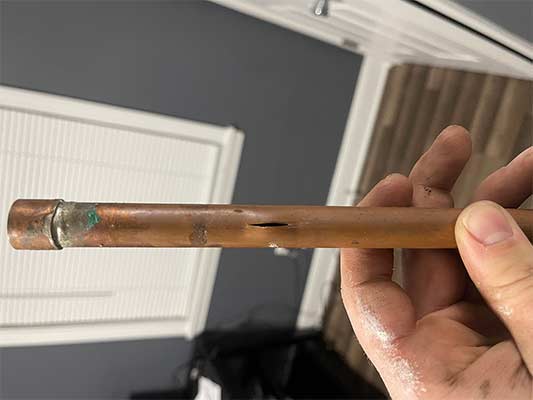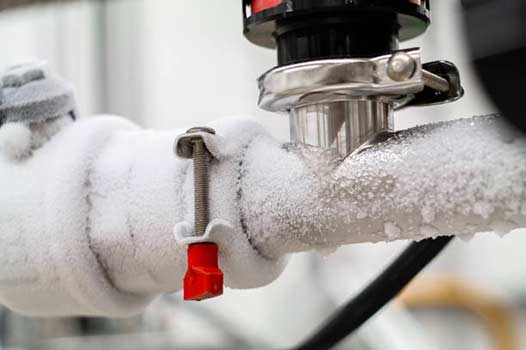The Cold Reality of Frozen Pipes Revealed by Chicago Plumbing Experts
Chicago, known for its harsh winters and freezing temperatures, is a city where residents often experience the unfortunate consequences of frozen pipes. Plumbing experts in the city have seen firsthand the damage that frozen pipes can cause, and they are sharing their insights to raise awareness and help homeowners prevent this common winter issue.
Understanding the Phenomenon of Frozen Pipes
When the temperature drops below freezing, water in pipes can freeze and expand. This expansion puts pressure on the pipes, increasing the risk of cracks or bursts. Not only can frozen pipes disrupt the water flow in your home, but they can also lead to significant water damage when the ice thaws and the pipes rupture.
The severity of the problem depends on the duration and intensity of the freezing temperatures. In Chicago, where winters can be particularly harsh, the risk of frozen pipes is heightened. It is essential for residents to take preventive measures to avoid costly plumbing repairs.
Tips for Preventing Freezing Pipes
Chicago plumbing experts recommend the following tips to protect your pipes from freezing:
- Insulate Your Pipes: Make sure all exposed pipes, especially those in unheated areas like basements, crawl spaces, and attics, are properly insulated. This can help maintain a higher temperature and prevent freezing.
- Seal Air Leaks: Check for any air leaks near pipes and seal them properly. Cold air drafts can cause pipes to freeze more quickly.
- Keep Interior Temperatures Consistent: Avoid drastic temperature fluctuations in your home, especially during extremely cold weather. Consistent heat can help prevent freezing.
- Open Cabinet Doors: If you have pipes running through cabinets, keep the doors open to allow warm air to circulate and reach the pipes.
- Allow Faucets to Drip: When the temperature drops significantly, allowing faucets to drip can relieve pressure in the pipes and prevent freezing.
- Keep the Heat On: Even if you are away from home, do not turn off the heating completely. Set the thermostat to a low but consistent temperature to prevent freezing.

When frozen pipes thaw and burst, large amounts of water can flood your home
The Risks and Consequences of Frozen Pipes
Chicago residents must understand the potential risks and consequences of freezing pipes. Failure to address frozen pipes promptly can lead to the following:
- Water damage: When frozen pipes thaw and create a burst pipe emergency, large amounts of water can flood your home, damaging walls, floors, furniture, and personal belongings.
- Mold growth: Moisture from leaking or burst pipes can create an ideal environment for mold growth, which can be hazardous to your health.
- Structural damage: The force of bursting pipes can cause structural damage to your property, requiring costly repairs.
- Disrupted water supply: Freezing pipes can prevent water from flowing, leaving you without access to essential amenities.
- Higher water bills: Leaking or burst pipes can result in water wastage, leading to higher utility bills.
What to Do if Your Pipes Freeze
If you discover that your pipes have frozen, it is crucial to take immediate action to prevent further damage. Follow these steps:
- Keep the faucet open: As you thaw the freezing pipes, water and steam will be released. Keeping the faucet open will allow the water to flow and relieve pressure.
- Apply heat: Use a hairdryer, heat lamp, or electric heating pad to slowly thaw the frozen sections of the pipe. Start from the nearest faucet and work your way towards the blockage.
- Avoid open flames: Never use an open flame or blowtorch to thaw pipes, as this can lead to fires or cause damage to the pipe.
- Contact a professional plumber: If you are unable to thaw the pipes yourself or if there is a burst pipe, it is crucial to contact an emergency plumber in Chicago immediately to assess and repair the damage.
In Summary
Frozen pipes are a common problem faced by homeowners in Chicago during winter. Taking preventive measures and knowing how to handle frozen pipes can help avoid costly repairs and damage to your property. By following the advice and tips provided by Chicago plumbing experts, residents can protect their pipes and ensure a smooth and uninterrupted water supply even in the coldest months.
